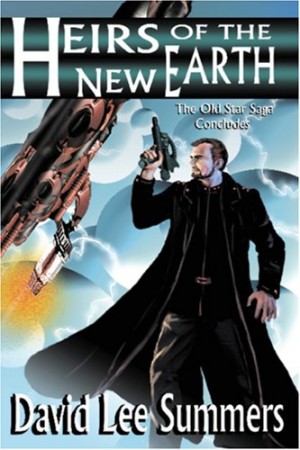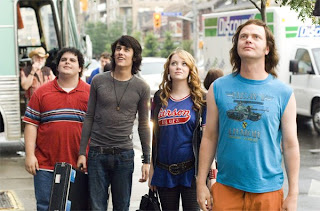A life-changing meeting with Ray Bradbury inspired David Lee Summers to pursue his own writing dreams
 Our Round 2 Q and A is with Lachesis Publishing author David Lee Summers. David has written several horror and science fiction novels for Lachesis including The Pirates of Sufiro which is free, and Dragon's Fall: Rise of the Scarlet Order.
Our Round 2 Q and A is with Lachesis Publishing author David Lee Summers. David has written several horror and science fiction novels for Lachesis including The Pirates of Sufiro which is free, and Dragon's Fall: Rise of the Scarlet Order.What was your favourite book as a child and why?
Two books stand out for me from my childhood. The first is Where the Wild Things Are by Maurice Sendak. I was captivated by the lush illustrations and the simple, yet evocative language. The Wild Things scared me as a kid, but Max impressed me by taming them and becoming their king. The other book is Pecos Bill: The Greatest Cowboy of All Time by James Cloyd Bowman. It was the first chapter book I remember reading. I loved the fact that it was a fantasy set in the Wild West. It included elements from the stories my mom, dad, uncles, and aunts told me about homesteading in New Mexico, but ramped them up and made them even wilder. Really, I think this book more than any other laid the groundwork for me learning how to adapt stories from my life into science fictional or even horrific settings.
Who was your favourite teacher growing up and why?
My favorite teacher was Elfriede Mayor. We called her "The Frau." She taught both high school German and journalism. In her German class, I learned a love of language and words. I also discovered the original Grimm Fairy Tales and learned they were much darker than I thought. In her journalism class, I learned to express myself and write regularly and how to do a word count.
One time, I wrote an editorial criticizing the school's policy of covering natural areas with blacktop. The school board actually wrote a letter demanding an apology. The Frau stood beside me and said I owed no apology, that I had presented a fair criticism and supported my opinion. I never forgot that lesson in democracy and standing up for my opinions.
When did you know you wanted to be a writer? Why?
When I was about eight or nine years old, my parents bought me the book The Trouble With Tribbles by David Gerrold. It told the story of how Gerrold wrote and sold the episode of the same name to Star Trek. At the time, I liked making up stories and writing them down. Gerrold showed me it was possible to do that for a living. I was hooked by the idea.
Who in the writing/publishing world do you admire and why?
This is a difficult question because there are so many people I admire, but if I have to pick just one, I'll go with Ray Bradbury. He spent years in the library reading great works, then used the lessons from that time to become a great writer in his own right. He transcended genre and defies classification. He wrote poems, short stories, novels, plays and screenplays. He used whatever medium worked best for the story he wanted to tell. He went from an unknown, penniless writer to one of the best known, best loved writers of all time. When I first met him in 1983, he was literally one of the nicest people I ever met. Even as a teenage kid who'd barely written anything, he made me feel like a peer. What's more, he had a great family life and raised four daughters. He helped many other writers get started in the world and he always supported other writers. When my story "The Slayers" appeared in Realms of Fantasy Magazine, he wrote me a note congratulating me. Ray Bradbury is the person who comes to mind not only when I think of the kind of writer I want to be, but the kind of person I want to be.
Tell us about your daily writing routine – what do you typically do every day?
My "day" job is operating telescopes at Kitt Peak National Observatory. This is a job I do from sunset to sunrise for six nights out of every fifteen, hence the reason "day" is in quotes! When I'm on duty at the observatory, writing is irregular, especially during the long nights of winter. However, when I'm off duty, I try to spend quality time writing.
On a typical writing day, I wake up and have breakfast and coffee while checking my email. I then shut that down to avoid distractions and write for a couple of hours. From there, I'll take a walk to get some fresh air, clear my head, and think about the next scenes. When I return home, I typically write for a couple more hours, then break for lunch. After lunch, I may run errands, or catch up on social media. If I have time before my wife and kids get home, I'll usually get in one more afternoon writing session. Evenings are for family. We share dinner and often enjoy a good science fiction show or even a scary movie.
What is your favourite snack or guilty pleasure food that you (may or many not ;) indulge in when writing?
My writing day always starts with a steaming mug of black coffee beside me. It's a critical part of my writing process. I also like to snack on nuts when I write. Cashews are a particular favorite. I also love habanero almonds. A square of chocolate often serves as my reward for a successful writing day.
 What does “writing voice” mean to you? Describe your own writing voice.
What does “writing voice” mean to you? Describe your own writing voice."Writing voice" is the way a writer puts words together to present a narrative. For some writers it's informal and fun as though they're sitting in the room chatting with you and relating a story. For others, it can be more gothic and poetic, as though they've picked each word with the utmost care. Because of my background writing papers in astronomy, I think my writing voice is clear and direct. Many have described my writing voice as similar to Ernest Hemmingway's, which I take as a great compliment.
What do you want to accomplish in the next five years in your writing career?
We live in a multimedia world and I'd love to see my works transcend the printed page and move into audio books or even visual media of some sort. Over the next five years, I would love to learn more about what I can do to turn that dream into reality. In addition to that, I plan to complete my Clockwork Legion steampunk series for Sky Warrior books and hope to complete my Wilderness of the Dead horror series for Lachesis.
It’s the season to give thanks. What are you thankful for?
I am thankful for publishers such as Lachesis Publishing that have believed in me and published my books. I am thankful to my family for standing by me and supporting me, even when times have been difficult.
 Pumpkin pie or Pecan pie?
Pumpkin pie or Pecan pie?As someone who loves to munch cashews and almonds, and as someone who lives in one of the great pecan growing regions of the United States, I have to go with pecan pie.
Connect with David Lee Summers. online via facebook and twitter, and check out his web site.
Like our Lachesis Publishing page on facebook.
Follow Lachesis Publishing on twitter.

Comments
Post a Comment
We would love to hear from you but hope you are a real person and not a spammer. :)